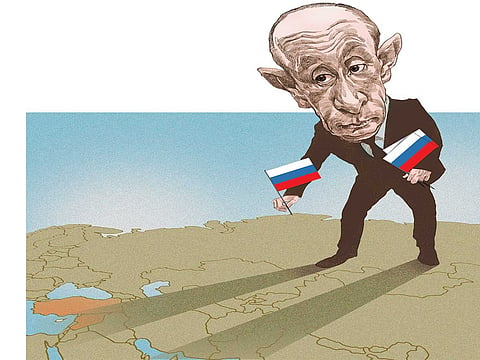Russia’s play in Syria will give it access to a warm water port
Its leaders for centuries have sought access to the warm waters of southern ports, as the northern ports are limited by ice and enemies

Russia’s new alliance with Turkey to find what they call a solution to the fighting in Syria needs to be seen in a global context as Russia rebuilds its military presence around the world, seeking the same respect in global council chambers that was enjoyed by the Soviet Union. Russia may or may not be interested in a just and inclusive settlement to Syria’s many concurrent civil wars, but it is certainly interested in the naval base it occupies in Tartus on the Syrian coast of the Mediterranean Sea.
In October, Russia’s Deputy Defence Minister Nikolai Pankov spelt out how Tartus fits into the Putin government’s global military vision, when he announced that the port would be expanded to become a permanent base for the Russian navy, at the same time as Russia said it was considering reopening Soviet-era bases in Vietnam and Cuba. Reuters reported that Russia was also in talks about a base in Egypt and that it has looked at Venezuela, Nicaragua, the Seychelles and Singapore.
Not all of these ideas will succeed. For example, Russian President Vladimir Putin’s recent statement in favour of Libyan General Khalifa Haftar indicates that he has put into play an alternative to Egypt. Haftar’s militia currently controls the largest area of Libya of any militia and includes the important western port of Benghazi and the all-important western oil fields. If Putin can do for Haftar what he has done for Syrian President Bashar Al Assad, by offering enough direct military support to tilt the military stalemate in his favour, Putin could end up with a very useful ally with some large ports offering the Russian navy yet another base from which it could extend its military reach in the Mediterranean.
It is very important that anyone working with the Russians recognises that rebuilding governments is not Russia’s priority. Their military strategy does not require that their bases have to be in properly constituted nation-states.
Tartus is in Syria’s Alawite heartland and however the civil war pans out, whether Syria stays united or not, if there is an inclusive government or a new military regime, Russia will have its base in an area surrounded by loyal and grateful allies. The same applies to Libya where a struggling national reconciliation government is trying to survive as it is squeezed between Haftar’s secular militia and the Islamists based in Tripoli. If Haftar ends up with a permanent grip on some or all of the west, Russia’s gamble will be amply repaid.
Russia’s Achilles heel
The Russian military imperative is nothing new and goes back to the start of the Russian state when the Principality of Moscow was set up in the middle of the North European Plain that stretches from Germany through Poland all the way to the Pacific with nothing to form a natural barrier than the easily crossed Ural Mountains. Successive Russian rulers found that the only way to defend their state was to conquer ever more land in order to have the strategic depth that eventually defeated Napoleon’s Grand Army and Hitler’s Third Reich.
But however much territorial depth the Russians have achieved, their access to the world’s waterways has been a disastrously limiting factor. Shipping from Russia’s western ports on the Baltic have to pass through Danish-Swedish Kattegat and Skagerrak straights, currently dominated by Nato, and then though a southerly route down the English Channel, or more northerly route between Iceland and the United Kingdom in the North Atlantic — again Nato dominated.
The Arctic ports are frozen for several months a year and Vladivostok on the Pacific is ice-locked for several months a year and is anyway enclosed by the Sea of Japan, which is dominated by the Japanese.
Putin’s problem is no different from that which his predecessors wrestled with through the centuries. As Tim Marshall puts in his excellent new book Prisoners of Geography, “from the Grand Principality of Muscovy through Peter the Great to Stalin and Putin, every Russian leader has been confronted by the same problem: ports still freeze and the North European Plain is flat”.
Marshall clarifies: “This lack of a warm-water port with direct access to the oceans has always been Russia’s Achilles heel, as strategically important to it as [control of] the North European Plain. Russia is at a geographical disadvantage, saved from being a much weaker power only because of its oil and gas. No wonder, in his will of 1725, Peter the Great advised his descendants to ‘approach as near as possible to Constantinople and India. Whoever governs there will be the true sovereign of the world. Consequently excite continual wars, not only in Turkey, but in Persia... Penetrate as far as the Persian [Arabian] Gulf, advance as far as India’”.
This makes chilling reading for any militia leader seeking short-term advantage from an alliance with Putin. He must be aware that he is a small player in a centuries-old Russian strategy of gaining and keeping access to warm water.
Sign up for the Daily Briefing
Get the latest news and updates straight to your inbox



